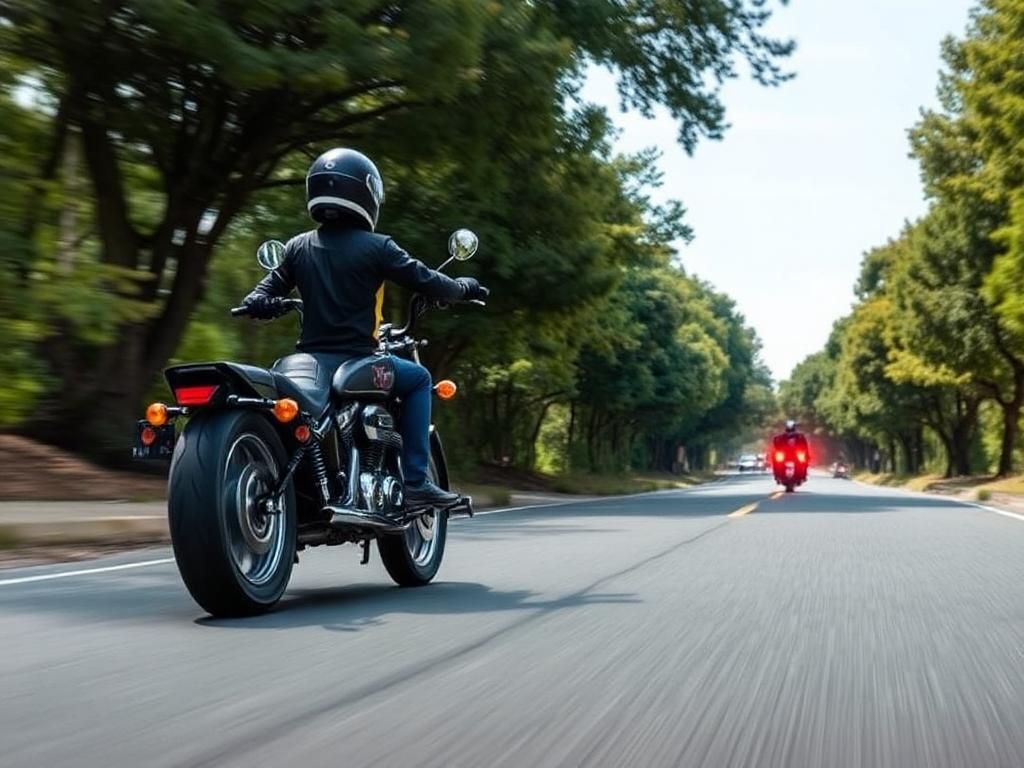The Texas motorcycle license is a crucial requirement for anyone looking to explore the beautiful landscapes of Texas on two wheels. Whether you’re a seasoned rider or a newcomer to the motorcycle community, understanding the license requirements can help you stay compliant and safe on the road. Riding a motorcycle in Texas can be a thrilling experience, but it also comes with its unique challenges and responsibilities. This guide will detail everything you need to know about obtaining and maintaining your Texas motorcycle license, ensuring you ride with confidence and knowledge.
Introduction to Texas Motorcycle Licensing
The importance of a motorcycle license in Texas cannot be overstated. Not only is it a legal requirement for operating a motorcycle, but it also serves as a testament to a rider’s commitment to safety and competency. Texas is one of the largest states in the U.S., boasting vast highways, scenic routes, and a vibrant motorcycle culture. However, with the freedom of riding comes the necessity of adhering to state regulations designed to protect riders and the general public.
Moreover, safety regulations and requirements are put in place to ensure that all motorcycle riders are adequately trained and equipped. Texas mandates that all riders must complete or be exempted from a Motorcycle Safety Course (MSC) before obtaining the Texas motorcycle license. This article will explore the different types of licenses available, the application process, and essential safety practices to enhance your riding experience.
Types of Motorcycle Licenses in Texas
Class M License
A Class M License is specifically designed for motorcyclists. To be eligible for this license, applicants must meet specific requirements, including age, residency, and completion of pre-licensing courses. The Class M license allows individuals to operate motorcycles, while a standard Texas driver’s license permits driving in cars. This distinction is vital for potential riders.
Required documents for a Class M application include proof of identity, proof of residency, and completion of the knowledge and skills tests. Understanding the differences between Class M and other license classes is essential for new riders to determine their specific licensing needs.
Restricted License
A restricted motorcycle license is available for younger riders. This license has limitations on specific motorcycle types or on riding unsupervised. Eligibility requirements typically include being at least 15 years old, having parental consent, and completing a motorcycle safety course. There are strict age restrictions intended to ensure younger riders have the support and experience necessary to ride safely.
Requirements for Obtaining a Texas Motorcycle License
Age and Residency Requirements
To apply for a Texas motorcycle license, you must be at least 15 years old. If you are under 18, parental consent is required, along with proof that you have completed the necessary safety training. Proof of residency is required, which can typically be shown through utility bills, lease agreements, or state-issued documents.
Pre-Licensing Requirements
Before obtaining a Texas motorcycle license, individuals must pass several pre-licensing requirements:
- Vision Test Details: All applicants must pass a vision test to ensure they can see clearly while riding.
- Written Knowledge Test Highlights: A written exam covers essential motorcycle operation and safety regulations.
- Motorcycle Training Course Requirements: Completion of a Motorcycle Safety Course is required for new riders, which not only enhances their skills but may also exempt them from the skills test.
Remember, having a valid Texas ID or driver’s license is vital and there are costs associated with obtaining a license that vary depending on the type of license applied for. The Motorcycle Safety Course (MSC) has fees that typically range between $150 and $300, which can lead to potential insurance discounts once completed.
Motorcycle Safety Course (MSC)
Benefits of Taking the MSC

Participating in the Motorcycle Safety Course offers numerous benefits beyond the immediate requirement for a Texas motorcycle license:
- Insurance Discounts: Completing the course often allows riders to qualify for discounts on their motorcycle insurance premium.
- Enhanced Riding Skills: The course helps improve practical riding techniques and knowledge of the road.
- Potential Waiver of Skills Test: Successfully completing the MSC may waive the need to take the skills test, streamlining the licensing process.
Course Structure
The Motorcycle Safety Course is designed to equip riders of all experience levels with essential riding skills. The structure typically includes:
- Overview of Course Content and Duration: The MSC typically lasts 15-20 hours, combining classroom work and hands-on training.
- Information on In-Classroom vs. Hands-On Learning: Riders will learn both in a classroom setting and through practical riding exercises, ensuring a comprehensive understanding of motorcycle operations.
Steps to Apply for a Texas Motorcycle License
Gather Required Documents
When preparing to apply for your Texas motorcycle license, it’s essential to gather the following required documents:
- Proof of identity (e.g., passport, birth certificate)
- Proof of residency (e.g., recent utility bill, lease agreement)
- Completion certificate from an approved Motorcycle Safety Course
Special considerations should be taken into account for out-of-state applicants, including verifying that their previous licensing meets Texas standards.
Complete the Application Process
The application process for a Texas motorcycle license involves several steps:
- Online vs. In-Person Application: Applicants can choose to apply online or in person at their local Department of Public Safety (DPS) office.
- Payment of Fees and Expected Costs: The application fees can vary; generally, expect to pay between $25 and $50 depending on the license type.
Passing the Exams
Successfully passing both the written knowledge and skills tests is crucial. The written exam typically covers road signs, traffic laws, and motorcycle operations. To prepare effectively:
- Commonly Tested Knowledge Topics: Understanding motorcycle controls, rights-of-way, and safe riding practices.
- Overview of the Skills Test Procedure: The skills test evaluates maneuverability, control, and safety during riding.
Renewing and Maintaining Your License
Renewal Process

Your Texas motorcycle license must be renewed on a regular basis. The renewal frequency typically spans between 6 to 8 years, depending on your age and license type. Required documentation includes your current license, proof of identity, and any necessary fees. Note that there may be different rules regarding renewal for older licenses, so it’s essential to check the latest guidelines from the Texas DPS.
Important Maintenance Tips
Maintaining your license also includes keeping thorough records of your motorcycle riding history, ensuring that any safety courses or training updates are documented. Staying informed about local riding laws and safety regulations helps to keep you legally compliant and safe.
Safety Regulations and Best Practices
Texas Motorcycle Laws
Familiarizing yourself with Texas motorcycle laws is essential for all riders. Key points include:
- Helmet Laws and Exceptions: Texas law mandates helmet use for riders under 21 years of age; those over may ride without one if they have the proper insurance.
- Lane Splitting Regulations: Currently, lane splitting is illegal in Texas, which riders must obey to avoid fines.
Safe Riding Practices
In addition to legal requirements, adopting safe riding practices is a must for all motorcycle enthusiasts:
- Importance of Riding Gear: Wearing protective gear such as helmets, jackets, gloves, and boots is vital for ensuring safety. The right gear can significantly reduce injury in the event of an accident.
- Defensive Riding Tips: Always stay aware of your surroundings, anticipate hazards, and use signals effectively to communicate with other road users.
Common FAQs About Texas Motorcycle Licenses
Frequently Asked Questions
- What if I fail the tests? You may retake the written or skills test on a different day. Check with the DPS for any waiting period or fee associated.
- Can I transfer my motorcycle license from another state? Yes, as long as your previous license meets Texas requirements, you can transfer it at a local DPS office.
- What should I do if my license is lost or stolen? Report the loss to the DPS and apply for a replacement. Fees usually apply.
- Is insurance mandatory for motorcycles in Texas? Yes, every rider must maintain liability insurance coverage to operate legally.
- What are the penalties for riding without a license in Texas? Fines may apply, and you could face additional penalties for having an unlicensed operation.
- Are there any age restrictions for motorcycle passengers? Motorcyclists must not carry more passengers than their motorcycle is designed for; typically, passengers should be at least 5 years old.
Conclusion
Obtaining a proper Texas motorcycle license is crucial for guaranteeing that you can legally and safely ride on the roads. Prioritizing safety and continued education as a rider is essential for personal safety and the well-being of others on the road.
Additional Resources
For more information on obtaining a Texas motorcycle license, consider visiting the following resources:
Key Points Summary
| License Type | Eligibility | Required Courses | Testing Required |
|---|---|---|---|
| Class M | 15+, Texas Residency | Motorcycle Safety Course | Written & Skills Test |
| Restricted License | 15+, Parental Consent | Motorcycle Safety Course | Written Test |
This comprehensive guide on the Texas motorcycle license equips you with the information needed to navigate the requirements and responsibilities associated with riding in Texas. Whether you’re applying for your first license or renewing an existing one, staying educated and prepared is vital to becoming a safe and responsible motorcyclist.